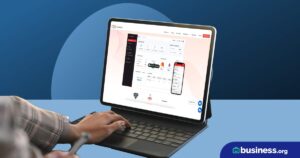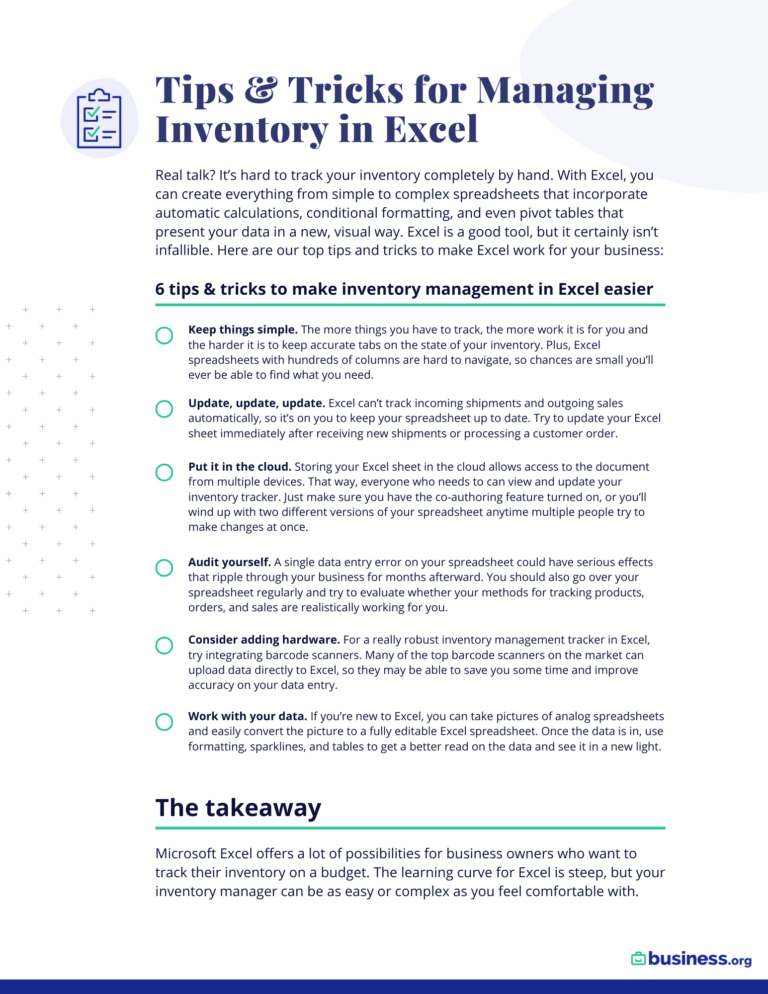💸 See if your business qualifies for a tax credit worth up to $26k per employee. 📞 Call Now: 855-979-9597
The 14 Best Inventory Management Software for Small Businesses of 2023
Data as of 12/2/22. Offers and availability may vary by location and are subject to change.
* With annual plan
We are committed to sharing unbiased reviews. Some of the links on our site are from our partners who compensate us. Read our editorial guidelines and advertising disclosure.
Inventory tracking and management is such a fundamental part of running a successful business that there are literally hundreds of software options to help you monitor your inventory data. But with so many options, how do you know which platform to choose?
Ultimately, the best inventory management software depends entirely on your business type. After all, there’s no point signing up for a system that includes wholesale order management if you don’t sell your products wholesale.
With that in mind, we’ve curated a list of our most-recommended inventory management solutions for each type of business. Among our favorites are Ordoro, inFlow Inventory, Upserve, Cin7, and Zoho. But ultimately, the right choice for your company comes down to your unique inventory needs.
Bottom Line: Zoho Inventory is the best inventory management software out there for small businesses. It's free, comes with ecommerce support and warehouse management, and has dozens of integrations to expand your business's footprint.
- : Best for small businesses
- : Best budget pick
- : Best for ecommerce
- : Best enterprise resource planning (ERP) solution
- : Best for restaurants
Top inventory management solutions at a glance
Data as of 12/2/22. Offers and availability may vary by location and are subject to change.
*With annual billing
º With integrations
Zoho Inventory: Best overall
Data as of 12/2/22. Offers and availability may vary by location and are subject to change.
Zoho Inventory has a lot to offer. For starters, Zoho offers a pretty comprehensive free plan that allows customers to accept backorders on out-of-stock items, arrange dropshipping, and handle multi-currency transactions. That gives small businesses a chance to keep their inventory organized without worrying about their limited budgets.
If you opt to upgrade your plan, though, you get enhanced features. You can manage multiple warehouses, enjoy serial number tracking and batch tracking, and sync multiple Shopify stores to your account. Plus, you'll get snazzy third-party integrations, including a connection with Amazon and its Fulfilled By Amazon (FBA) service.
Ultimately, though, we think Zoho works best for small and medium businesses only. Although its plans do offer a range of order limits—including the newly announced Elite plan (for $239 per month, billed annually), which offers unlimited orders—it’s the other features that help Zoho cater to a small- and medium-business clientele. With the elite plan, there are no limits on orders, shipping labels, or tracking. With five Shopify stores and 15 warehouses, it’s a great plan for medium businesses doing a lot of shipping and ecommerce.
If you’re a small business that doesn’t need to fulfill thousands of orders per month, Zoho Inventory is a very effective and inexpensive option. And you can stick with Zoho when you’re ready to expand too.
inFlow Inventory: Best budget buy
Data as of 12/2/22. Offers and availability may vary by location and are subject to change.
* With annual billing
For businesses on a budget, inFlow Inventory is a great inventory management system. inFlow offers, in our opinion, the best free inventory management service on the market (inFlow On-Premise). Or you can enjoy more features with inFlow’s paid plans—some of the cheapest available, starting at a low $89.00 per month.
Also, inFlow is remarkably easy to use, with many of its inventory tracking features automated. It’s even got a great mobile app that facilitates barcode scanning and keeps your sales agents and inventory manager on the same page for stock inventory levels.
One thing to keep in mind, though? inFlow Inventory is cheap because it’s more scaled back than other platforms on our list. While it makes managing inventory a breeze, inFlow caps the number of orders you can process monthly before you're charged extra. For example, the most expensive plan includes 10,000 sales orders per month.
By signing up I agree to the Terms of Use and Privacy Policy.
Ordoro: Best for ecommerce
Data as of 12/2/22. Offers and availability may vary by location and are subject to change.
It’s hard to practice good inventory management techniques when you’re juggling multiple sales channels. Fortunately, Ordoro makes multichannel selling easier. With Ordoro, you can create master products within your inventory system, allowing you to update descriptions, images, branding, and more across all (or some of) your sales channels at your discretion.
Ordoro also offers vendor management features that make dropshipping a breeze. For instance, you can assign vendors to specific products in your catalogue. Then, anytime a customer orders those items, Ordoro can automatically send the order to the appropriate vendor, thereby cutting out the middleman (you), maximizing supply chain efficiency and ensuring your customers get their items as quickly as possible.
We also like that Ordoro makes nontraditional inventory management strategy possible. For instance, you can opt to strategically oversell your goods or limit the number of instock items visible to your customers—both of which create the illusion of scarcity and motivate your potential buyers to complete their purchase. Ultimately, this helps you turn a better profit and avoid storing expensive excess inventory.
Cin7: Best ERP solution
Data as of 12/2/22. Offers and availability may vary by location and are subject to change.
Most enterprise resource planning (or ERP) platforms feature modules for every aspect of your business (like accounting, point of sale, inventory, and shipping)—and they charge you for each module you add to your plan. Those costs add up, making ERP systems outlandishly expensive for all but the largest companies.
Cin7 breaks the mold by offering built-in modules that come standard with your plan. In addition to a fully integrated POS system, Cin7 comes fully loaded with B2B ecommerce features, manufacturing features, and even a payment portal. And that’s all in addition to the barcode scanning, inventory tracking, and order fulfillment features you’d expect from your inventory solution.
Cin7 also offers advanced demand forecasting and multichannel support, including cross-channel syncing every five minutes. This ensures you have a dynamic inventory system that stays up to date, helping you achieve proper inventory management with minimal effort.
The downside? While Cin7 isn’t as expensive as most ERP solutions, it is among the more expensive platforms on our list (starting at $299.00 per month).
Upserve: Best for restaurants
Data as of 12/2/22. Offers and availability may vary by location and are subject to change.
Upserve provides a dynamic inventory solution for the unique needs of restaurants. Specifically, Upserve offers a greater focus on expiration date tracking and specialty supply chain needs (like refrigerated shipping) than other inventory control software options.
Yes, Upserve is a bit pricey, but it provides everything you could need in one service. You can run your online ordering, point-of-sale (POS) services, and workforce management—even across multiple locations. Upserve even provides insights and tools that make it easier to run your restaurant.
What’s more, Upserve provides features just for restaurants. For instance, you can use Upserve inventory software to create recipes for the dishes you sell, customizing each recipe with the precise ingredients and amounts needed. Then, when you sell that dish, Upserve can automatically deduct those quantities from your inventory levels for the ingredients used. You can even use this feature to determine pricing for your menu items and identify food waste.
We also like that Upserve comes with a built-in POS system—though admittedly, we don’t love that you’re restricted to using (and paying for) Upserve’s unique proprietary POS hardware. Still, if you’re running a restaurant, Upserve is probably the best inventory management software you could hope for.
Honorable mentions
We found nine brands that offer really good inventory management for businesses but don’t reach the heights of our top five. Most of these brands are focused on larger businesses—with an emphasis on warehousing and multiple locations—but they still offer features that can appeal to everyone.
Inventory management software honorable mentions
- : Best for warehousing and manufacturing
- : Best for multi-location businesses
- : Best for enterprise-level businesses
- : Best for fast-growing warehouse businesses
- : Best for asset tracking
Compare our honorable mention inventory management software options
Data as of 12/2/22. Offers and availability may vary by location and are subject to change.
* With annual billing
º Includes tracking for 250 items
¶ With integration
Fishbowl Inventory: Best for warehousing and manufacturing
Data as of 12/2/22. Offers and availability may vary by location and are subject to change.
Fishbowl Inventory impressively covers everything you could want from an inventory management system. They’ve managed to combine manufacturing with warehousing features—all in one. That means you have barcoding, multichannel tracking, shipping, customer relationship management, easy purchase order creation, and cost reconciliation. Add to that the dozens of integrations and the fact that Brightpearl is basically built to work with QuickBooks, and you have a very solid inventory management system.
But while its features are great, its high pricing and add-ons bring the score down. Because of the emphasis on manufacturing and warehousing, Fishbowl Inventory is best for medium to enterprise-level businesses, but it can work for anyone. Just make sure it’s within your price range first!
If you’re looking for just warehouse features, Fishbowl Warehouse is available for a $4,395.00 one-time fee and includes reduced features that are focused on warehousing businesses. Fishbowl Inventory is the Fishbowl Manufacturing software, which includes Warehouse and Manufacturing features in one.
Oracle Netsuite: Best for multi-location businesses
Data as of 12/2/22. Offers and availability may vary by location and are subject to change.
Oracle's systems are not for everyone, and the user experience (UX) on this one leaves a lot to be desired. But Oracle NetSuite does a lot for multi-location businesses that are moving products. Its features focus more on warehousing and product management than shipping or organizing records. But that makes it really good for larger businesses with multiple locations.
The price is a big detriment. The base cost is $999 per month, and that takes many businesses out of the running. But for those businesses with multiple locations, it can be super helpful to have the barcoding and warehouse features. So, if you are already using Oracle products, then you are well suited to bring NetSuite into your business.
Brightpearl: Best for enterprise-level businesses
Data as of 12/2/22. Offers and availability may vary by location and are subject to change.
Brightpearl brings a lot to the table and focuses on being a one-stop shop for running your business. Of course, it is also only focused on large businesses (with sales in excess of $1 million), so that takes a lot of small businesses out of the running. However, if you are a large enterprise-level business looking for a new inventory management software, Brightpearl is a great choice.
One big con is that the price is only available upon request. Since we don’t know a lot about the cost of the software or its add-ons, that makes it a difficult product to recommend.
Unleashed Inventory: Best for fast growing warehouses
Data as of 12/2/22. Offers and availability may vary by location and are subject to change.
* With annual billing.
Unleashed is our choice for businesses that need advanced warehouse management. It’s a bit less expensive than Fishbowl (which runs at $366.25 per month for its warehouse-only software) and supports unlimited warehouses, transactions, and products, plus a B2B ecommerce site and basic production features to help implement your ideal inventory management strategy.
So what's the drawback? Only three users are included in the midsized business plan (the least expensive option from Unleashed) and B2B ecommerce costs an extra $129 per month. Add to that the compulsory managed onboarding at $329, and you’re buying software that will run you $737 for the first month! If you’re a smaller business using warehouses, it’s probably not worthwhile.
EZOfficeInventory: Best asset tracking
Data as of 12/2/22. Offers and availability may vary by location and are subject to change.
* With annual billing.
EZOfficeInventory is the perfect inventory control software for businesses with a lot of not-for-sale assets, like employee computers and other equipment. In addition to traditional inventory management tasks, the inventory system lets you schedule maintenance, track wear and tear, and assign work orders.
But since EZOfficeInventory is focused on asset tracking—versus other systems that are mainly retail-focused—it’s for a specific kind of business. If you’re looking to keep track of assets and not retail products, this is great software for any sized business.
Other top inventory software options
The takeaway
When it comes down to it, the best inventory management software depends a lot on your business size, model, and product type. While we definitely think Zoho Inventory is the best inventory system overall, Upserve, Cin7, inFlow Inventory, and Ordoro all offer excellent inventory tracking and stock management solutions for different types of businesses. And if you’re in need of a quality inventory system on a budget, inFlow Inventory is a top pick too.
Hopefully, this guide has given you enough information to make an educated decision on what type of system will work best for your business.
Not sure if inventory tracking software is right for your business? That’s cool. But even if you opt not to use software, every business needs a way to manage their inventory and supply chain. Find out more in our guide to why inventory management is important.
FAQ about inventory management software
While there are a lot of methods for inventory tracking, managing inventory is easier and more accurate with inventory software.
There are a lot of inventory management software options available, each offering its own unique blend of item tracking, warehousing, production, supply chain, and order fulfillment features. That means the best inventory software for your business often depends on your business type and inventory needs. In general, though, we prefer Ordoro’s comprehensive feature list.
Finding the right inventory management software solution can help your business save time and money, which is why inventory management is so important. Inventory software allows you to automate your inventory tracking, so you can keep real-time tabs on how much product you have in stock. You can also pair inventory software with barcode scanning for faster shipment processing in your warehouse.
Inventory management software also helps you cut down on costs. It helps you keep track of when to reorder, and it usually comes with advanced reporting so you can tell which products are selling well. In some cases, inventory software may also include demand forecasting, which helps you avoid the extra cost of excess inventory.
Check out our guide to how inventory management software can help you reduce costs for more info.
What's the best free inventory management software?
In our opinion, the best free inventory management software is inFlow On-Premise. In addition to helping you track inventory levels and basic order management, inFlow On-Premise supports multiple warehouse management. However, if you’re looking for a cloud-based option, Zoho Inventory is another excellent option.
Keep in mind, though, that free software options may not include all the order management, warehousing, and production features your business needs—and very few offer accounting software integration. To find out more, read our comprehensive guide to the top free inventory management software options.
If you’re on a budget and have Microsoft Office, you may have a ready-made inventory optimization tool already. With Microsoft Excel, you can track all the data points you need to manage your inventory, optimize your supply chain, and keep your business organized. Check out our guide on how to use Excel to manage inventory to learn more.
Do I need any hardware to get my inventory management system started?
Certain types of hardware can help you integrate barcode scanning and on-the-go features. These hardware options can significantly simplify your inventory management, so it’s important to choose inventory software that integrates easily. The most commonly used inventory control hardware includes the following:
- Automatic barcode scanners
- Handheld scanners
- Tablets
- Printers
Methodology
We looked at over 30 of the top inventory management brands to find our top choices for inventory management software. We specifically looked at price, features, integrations, and user experience to determine our rankings and reviews.
89% of Small-Business Owners Experience Shoplifting
As we approach the two-year mark for the pandemic outbreak, over half of small businesses have experienced an increase in shoplifting during 2021.1
According to our survey of small-business owners, shoplifting worsened in 2021.
- Up to 89% of small-business owners experience shoplifting—a 1% increase from our 2020 report.
- During peak seasons, like holiday shopping, 54% of small-business owners report an increase in shoplifting.

Most small businesses experience shoplifting
In the US, 89% of small-business owners have had a customer shoplift from their store in 2021.
Compared to 2020, small-business owners reported that daily shoplifting nearly doubled in 2021 (14% in 2020, 23% in 2021).
- 25% of small-business owners experience shoplifting on a weekly basis.
- 23% of small-business owners experience shoplifting on a daily basis.
How do small businesses respond to shrink?
Only 28% of businesses have a shoplifting policy in place to prevent theft. And 67% of small-business owners report using inventory management software, while only 29% of those use inventory management software solely to track theft.
- 25% of small businesses have increased their product prices because of shoplifting.
- 57% of small-business owners have called the police because of shoplifting in the last year.
- 15% have experienced a shoplifting incident turning violent in the last year.
Comparing 2021’s shoplifting with 2020’s numbers, we found fewer businesses are raising prices due to shoplifting or calling the police for shoplifting. Only 15% of shoplifting incidents have turned violent in 2021, nearly half compared to 28% in 2020.
What items are stolen the most by customers?
Most customers grab the smaller-value items which are likely to go unnoticed—things like food and drink, clothing, and cosmetics. However, money and electronics also offer high appeal with the potential for easy concealment.

Thieves don’t always look for a quick grab-n-go robbery: 21% of small businesses have had customers steal something at the same time they are making a purchase. And 25% of small businesses have had to deal with customers using stolen credit cards.
Customers aren’t the only ones stealing
It’s easy to think that customers and strangers are the only ones grabbing your goods, but employees are also a source of theft from small businesses.
- 22% of small-business owners have had employees steal from them.
- 35% have caught shoplifters on camera, while 42% have personally caught the employee shoplifting.
Which items are stolen the most by employees?
Most employees steal money, food and drink, clothing, time, and office supplies. While on the job, these items are less likely to be noticed by employers and more easily stolen over time than high-value items. However, electronics may still end up missing from the workplace too.

How can you prevent shoplifting in your small business?
If you’re a small-business owner, having a clear, defined shoplifting policy can guide you and your employees in individual incidents. However, most small-business owners reported they don’t have a policy in place—so start there.
To keep better track of your stuff, inventory management software (like Ordoro) can help you spot gaps in your inventory, but it also helps lock in your supply chain—which is a growing issue for small businesses. You can also opt for getting a security system for your business. Although a camera or alarm won’t necessarily stop a thief in the act, they will deter some would-be thieves and potentially provide evidence.
Methodology
We partnered with Pollfish to conduct an anonymous survey of 700 small-business owners with a +/- 2% margin of error with a confidence level of 95%. Business.org analyzed the results and compiled this report. To learn more about Pollfish and how it organically finds respondents, check out its methodology.
Disclaimer
At Business.org, our research is meant to offer general product and service recommendations. We don't guarantee that our suggestions will work best for each individual or business, so consider your unique needs when choosing products and services.













